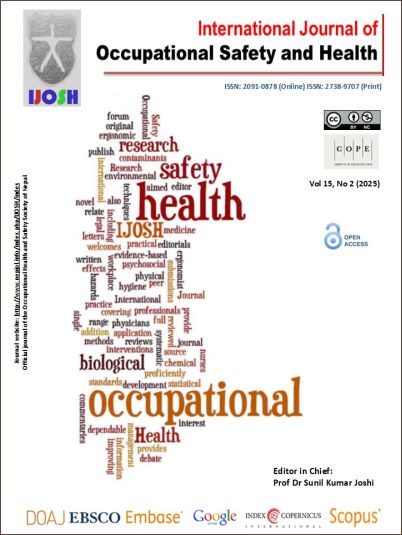Linking laboratory air quality to workers’ psychological performance in Malaysian university laboratories
DOI:
https://doi.org/10.3126/ijosh.v15i2.70692Keywords:
indoor air quality, laboratory workers, occupational health, psychological performance, ventilationAbstract
Introduction: Poor indoor air quality (IAQ) in laboratories can negatively impact worker comfort and psychological well-being. This study investigates the relationship between IAQ and psychological performance among laboratory workers in Malaysia.
Methods: This cross-sectional study was conducted from October to November 2023 in six university laboratories categorised into chemical and non-chemical. A total of 52 workers, aged 20-49 years, participated. IAQ was measured in real-time for 8 hours during weekdays using instruments to monitor particulate matter (PM2.5, PM10), carbon monoxide (CO), total volatile organic compounds (TVOC), airborne microorganisms, carbon dioxide (CO2), temperature (°C), relative humidity (RH), and air movement. Psychological distress was assessed using the General Health Questionnaire (GHQ-12). Data were analysed using Kruskal-Wallis, One-Way ANOVA, and Chi-Square tests.
Results: Significant differences in IAQ parameters were found across laboratories, with elevated PM2.5 (p=0.007) and PM10 (p=0.020), and high CO levels (p=0.042). Over 51.9% of workers experienced psychological distress, particularly those exposed to high CO levels (≥2.5 ppm) and temperatures above 23.3°C. Workers in these conditions were 6.5 times more likely to report discomfort (p=0.042).
Conclusion: High CO levels and elevated temperatures are significantly associated with psychological distress among laboratory workers. Improving ventilation and maintaining optimal temperatures could enhance both comfort and mental well-being in laboratory environments. External stressors may also influence psychological performance but were not fully controlled.
Downloads
Downloads
Published
How to Cite
Issue
Section
License
Copyright (c) 2025 The Author(s)

This work is licensed under a Creative Commons Attribution-NonCommercial 4.0 International License.
This license enables reusers to distribute, remix, adapt, and build upon the material in any medium or format for noncommercial purposes only, and only so long as attribution is given to the creator.





